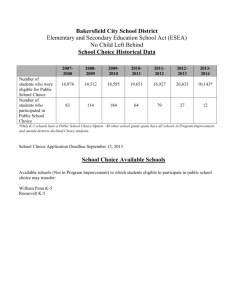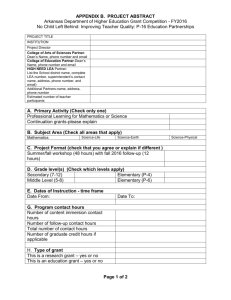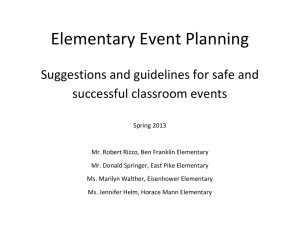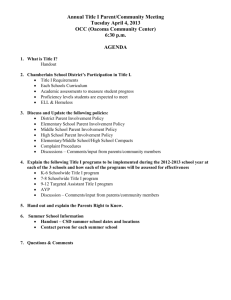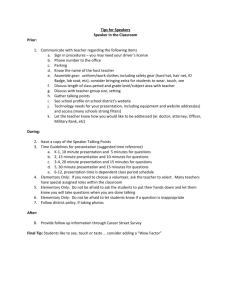Special Education System Overview
advertisement
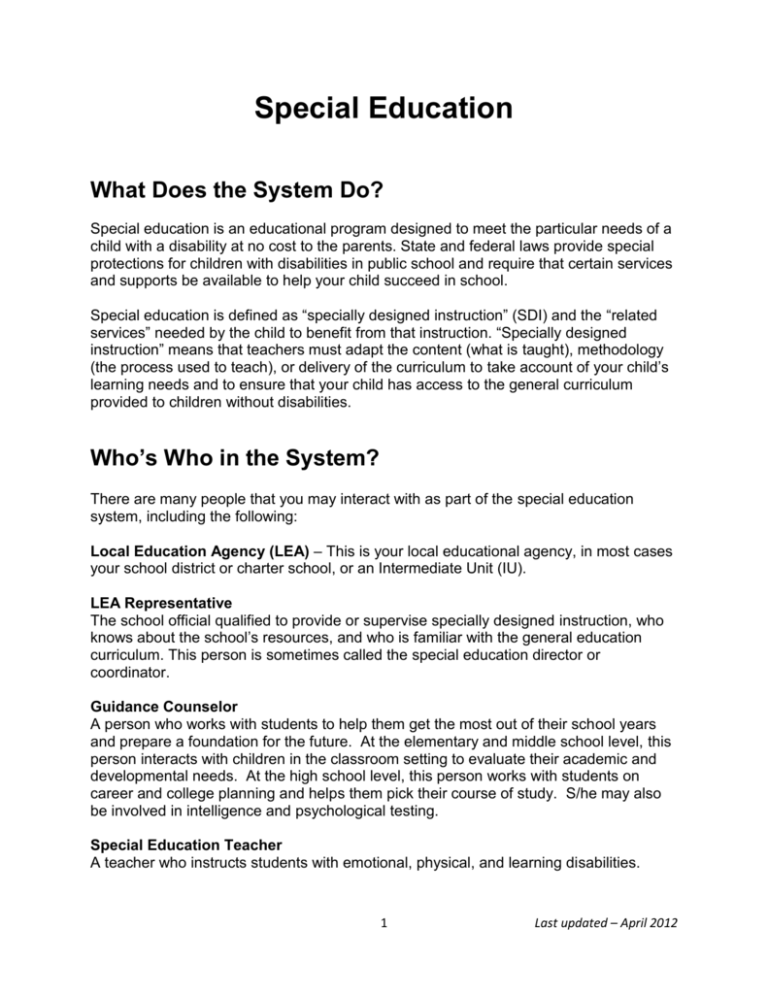
Special Education What Does the System Do? Special education is an educational program designed to meet the particular needs of a child with a disability at no cost to the parents. State and federal laws provide special protections for children with disabilities in public school and require that certain services and supports be available to help your child succeed in school. Special education is defined as “specially designed instruction” (SDI) and the “related services” needed by the child to benefit from that instruction. “Specially designed instruction” means that teachers must adapt the content (what is taught), methodology (the process used to teach), or delivery of the curriculum to take account of your child’s learning needs and to ensure that your child has access to the general curriculum provided to children without disabilities. Who’s Who in the System? There are many people that you may interact with as part of the special education system, including the following: Local Education Agency (LEA) – This is your local educational agency, in most cases your school district or charter school, or an Intermediate Unit (IU). LEA Representative The school official qualified to provide or supervise specially designed instruction, who knows about the school’s resources, and who is familiar with the general education curriculum. This person is sometimes called the special education director or coordinator. Guidance Counselor A person who works with students to help them get the most out of their school years and prepare a foundation for the future. At the elementary and middle school level, this person interacts with children in the classroom setting to evaluate their academic and developmental needs. At the high school level, this person works with students on career and college planning and helps them pick their course of study. S/he may also be involved in intelligence and psychological testing. Special Education Teacher A teacher who instructs students with emotional, physical, and learning disabilities. 1 Last updated – April 2012 Evaluation Team A team of educators, other professional individuals, and the child’s parents that reviews all formal testing of a child and all other evaluation material. The evaluation team must issue a written report stating if the child is a child with a disability who needs special education and making suggestions about the programs and services needed. What are the Rights and Responsibilities That I Need to Know About? The law guarantees every eligible child with a disability the right to a free appropriate public education (FAPE). A free appropriate public education is a planned program of education and special services that takes account of the child’s individual needs. An appropriate program allows the child to make meaningful progress and to prepare for employment and independent living. Each child’s program must be provided without cost to the family. Parents play a key role in ensuring that an eligible child receives an appropriate program of special education services and supports. Some of the most important rights of parents are: To be a member of the Team that develops your child’s education program (called an Individualized Education Program or IEP), and to attend meetings about that program. To get written notice (called a Notice of Recommended Educational Placement/Prior Written Notice or NOREP/PWN) when the school decides if your child is eligible for special education, and before your school district changes your child’s program or refuses to change your child’s program. To understand every document you sign. To disagree with what your school district wants to do (or refuses to do) for your child’s special education program and to pursue other options. To know and understand your rights in the language you understand the best. To see copies of all of your child’s education records. For the rights provided in special education law to work effectively, every child with a disability (or who is thought to have a disability) must have a “parent” who can act on her behalf. The law includes several categories of persons in the definition of “parent”: A birth or adoptive parent, The foster parent, 2 Last updated – April 2012 A “guardian” who has the authority to act as the child’s parent or who has the authority to make education decisions for the child, A family member with whom the child lives who is caring for the child (such as a grandparent or stepparent) even if that family member does not have legal custody from a court order, or someone who is legally responsible for the child’s welfare, or A “Surrogate Parent.” If a person does not fall into one of these categories, that person cannot make special education decisions for the child. A child’s caseworker can never be the education decision maker for a child. All special education programs and related services needed for an eligible child to receive an appropriate program must be provided free of charge to the family. School officials may not ask a family to use their private insurance to pay for an evaluation or service if there is any cost involved, such as an increase in a premium or decrease in annual or lifetime coverage. School officials may, with the parent’s agreement, use a child’s Medical Assistance card to pay for services that also qualify under the Medical Assistance program. These services could include, for example, speech or physical therapy. Medical Assistance may also pay for another agency to provide certain medically necessary services or equipment to children in school, such as the assistance of a registered nurse for a medically involved child, or the help of therapeutic support staff for a child who has significant behavioral health needs. Regardless of what agency ultimately provides or pays for the services, the school district must list the services on the child’s IEP and must make sure that any services needed by the child for an appropriate program are provided without cost. The special education services provided to each eligible child must be “appropriate” for that child. To be appropriate, the services must be developed according to the specific procedures. (These are outlined in Pennsylvania Parent Guide to Special Education for School Age Children in the “Resources” section.) In addition, the special education program and services must give the child an opportunity to make meaningful progress toward her IEP goals, and take account of the child’s potential for learning. How much progress is “meaningful” for each child depends on the individual child’s potential. Merely because the child is passing from grade to grade does not guarantee that the program is appropriate for the child. Special education law requires schools to report to parents on a regular basis the progress the child is making toward the goals in her IEP. Progress reporting must be done at least at the same time as report cards are issued to all children, or through 3 Last updated – April 2012 other periodic reports. If you are not getting regular progress reports from your child’s school, ask the school to give them to you. The school district where the parents live is responsible for making sure that each eligible child is located, evaluated, and provided with a free appropriate public education. Children who live in foster care, group homes, residential treatment or other child care facilities are entitled to receive their education from the school district in which the facility is located. See the following in the “Resources” section for more information on the rights and responsibilities regarding special education: The Right to Attend School in Pennsylvania How Do Custody Issues Affect Your Rights in the Public Schools? Pennsylvania Parent Guide To Special Education for School Age Children Parents’ Rights: Understanding the Procedural Safeguards Notice Resolution Meetings: A Guide for Parents and Educators What Special Programs are Available in Greene County? There are no special offered in Greene County as part of the special education system. Who are the Local Contacts in Greene County? The following are the LEA representatives (sometimes referred to as special education directors or coordinators) in each of the school districts in Greene County. Carmichaels School District Melissa Christopher Elementary School (K-6): 724-966-5045 Junior High (7-9): 724-966-5045 High School (10-12): 724-966-5045 Central Greene School District Tammy Mandich Perry Elementary (K-5): 724-324-2687 Central Elementary (K-5): 724-627-3081 Margaret Bell Miller (6-9): 724-852-2722 Central High School: 724-852-1050 4 Last updated – April 2012 Jefferson Morgan School District Sam Silbaugh Elementary (K-6): 724-883-2310 Carol Korber Middle School (7-9): 724-883-2310 Dave Bates High School (10-12): 724-883-2310 Southeastern Greene School District Scott Sinn Bobtown Elementary (K-6): 724-839-7575 Jodi Johnson Mapletown Jr./Sr. High School (7-12): 724-943-4769 West Greene School District Laura Walters Graysville Elementary (K-5): 724-428-3592 Spring-Freeport Elementary (K-5): 724-447-2313 Middle School (6-8): 724-499-5492 High School: 724-499-5524 For a list of other contacts in the school districts, see the “Resources Section” – “Greene County School Districts.” The following sources of information were used for this section: Pennsylvania Parent Guide to Special Education for School Age Children, Pennsylvania Department of Education, Bureau of Special Education, PA Training and Technical Assistance Network, 09/08. The Basics of Special Education Law: What Parents Need to Know to Get Started, Darr, Esq., Kelly and Lowman, Esq., Jennifer, Education Law Center – PA, 2009. The Right to Special Education in Pennsylvania: A Guide for Parents and Advocates, The Education Law Center – PA, 2009 Edition. Education-Portal.com - http://education-portal.com/ 5 Last updated – April 2012

